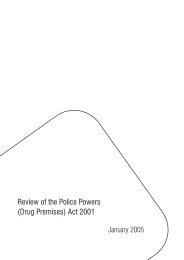Crimes (Forensic Procedures) Act 2000 - NSW Ombudsman - NSW ...
Crimes (Forensic Procedures) Act 2000 - NSW Ombudsman - NSW ...
Crimes (Forensic Procedures) Act 2000 - NSW Ombudsman - NSW ...
Create successful ePaper yourself
Turn your PDF publications into a flip-book with our unique Google optimized e-Paper software.
involved in the investigation of the offence. A copy of the consent form must be given to the volunteer, parent or<br />
guardian as soon as practicable. 674<br />
<strong>NSW</strong> Police has developed separate consent forms for suspects, volunteers, and children and incapable people, to<br />
reflect the legislative requirements relating to each category. During our audits, we found that some commands were<br />
not aware that <strong>NSW</strong> Police had issued separate consent pads for volunteers and for children and incapable people.<br />
Some had volunteers sign the volunteer information sheet, while others were using suspect consent forms for all<br />
forensic procedures. This raises concerns that forensic procedures may have been conducted on volunteers without<br />
complying with the requirements set out in the legislation – specifically, that the volunteer signed the consent form in<br />
the presence of an independent person, and that the volunteer specified whether his or her DNA profile would be put<br />
on the DNA database and what it would be matched against.<br />
We also have concerns about whether volunteers are giving informed consent to forensic procedures. As discussed<br />
in chapter 6, police are not always providing the correct information to volunteers. In particular, there is considerable<br />
confusion among police officers about whether volunteer profiles are put on the DNA database, and what index they<br />
should be put on. As discussed at 6.1.4, DAL puts all volunteer profiles on the DNA database. It does not match them<br />
against any of the other indexes, unless it confirms with the officer who took the sample that the volunteer did actually<br />
specify that his or her DNA sample could be used for unlimited purposes.<br />
We are concerned that many volunteers have provided DNA samples on the basis that their profile would not be put<br />
on the DNA database, when in fact it has been.<br />
Our recommendations 11 and 12 about providing accurate information to volunteers about forensic procedures<br />
should address our concerns about whether volunteers are giving informed consent. In addition, our recommendation<br />
3(b) as to which police officers should perform forensic procedures will increase the likelihood that officers seeking<br />
consent from volunteers understand the distinctions between volunteer and suspect testing. The proposed forensic<br />
procedures book will include a copy of the volunteers form, allowing for easy auditing and education plus other<br />
remedial responses where necessary. Given the development and the practice of DAL to date, we do not propose to<br />
make any further recommendations on this issue.<br />
7.5.3. Should child volunteers be able to consent to forensic procedures<br />
A forensic procedure may be carried out on a child volunteer with the consent of the child’s parent or guardian,<br />
provided the child does not object to or resist the procedure. 675 Unlike child suspects, child volunteers can never be<br />
compelled to undergo a forensic procedure, and any DNA sample taken from the child volunteer will normally be used<br />
within the case for which it was provided, and will not be matched against the entire crime scene index.<br />
We note the 2002 recommendation by the Legislative Council Standing Committee on Law and Justice that the<br />
Attorney General consider amending the child volunteer provisions so that forensic procedures can be conducted on<br />
volunteers between the ages of 10 and 14 with the consent of the child and the child’s parent, and volunteers aged<br />
15 to 17 can consent to forensic procedures themselves. 676 In submissions to our review, Legal Aid <strong>NSW</strong> and the Law<br />
Society of <strong>NSW</strong> suggested that a volunteer aged between 14 and 16 should be able to consent, provided the child’s<br />
parent or guardian also consents, and that a volunteer aged between 16 and 18 should be able to consent to the<br />
procedure without the involvement of a parent or guardian. 677<br />
We generally support the recommendation that child volunteers who are sufficiently mature should be able to consent<br />
to forensic procedures. Our only concern is that, because the distinction between suspects and volunteers is not<br />
always clear, police officers may treat children who are under investigation for an offence but who do not meet the<br />
threshold of ‘suspect’ for the purposes of the <strong>Act</strong>, as ‘volunteers’. If the child consents to the forensic procedure (or<br />
can be persuaded to consent), this obviates the need for police to obtain a court order. The <strong>Act</strong> as it currently stands<br />
protects children against this, to a limited extent, by requiring consent from the child’s parent or guardian before the<br />
procedure can be conducted.<br />
In our view these concerns could be adequately addressed by ensuring that child volunteers are given appropriate<br />
information about the proposed procedure, including why the procedure is required, that it might produce evidence<br />
against them, and that they do not have to undergo the procedure if they do not want to. Our recommendation 13,<br />
about providing child volunteers with information about forensic procedures, seeks to address this problem. On<br />
this basis, we agree with the recommendation of the Standing Committee that volunteers aged between 15 and<br />
17 should be able to consent to forensic procedures. However, an appropriate safeguard would be to ensure that<br />
child volunteers could only consent to providing a DNA sample for use within a particular case, and not for unlimited<br />
purposes.<br />
120<br />
<strong>NSW</strong> <strong>Ombudsman</strong><br />
DNA sampling and other forensic procedures conducted on suspects and volunteers under the <strong>Crimes</strong> (<strong>Forensic</strong> <strong>Procedures</strong>) <strong>Act</strong> <strong>2000</strong>

















